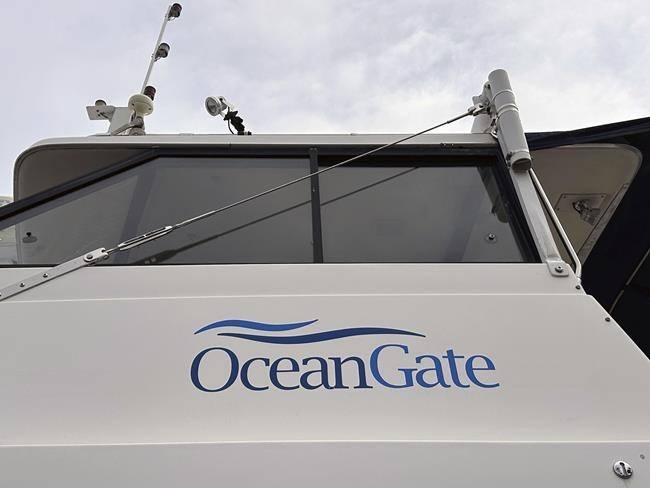ST. JOHN'S, N.L. — The owner of a small submersible that imploded and killed five people on its way to the wreck of the Titanic has legal avenues to seek court protection from costly litigation, a maritime law professor at Louisiana's Tulane University said Friday.
Martin Davies said OceanGate Expeditions has the option to file an application through a maritime limitation of liability act. If the application is successful, a court would cap the amount of money the company would have to pay out if it was successfully sued by family members of the five people who died on the Titan.
"Whenever it comes up in a personal injury context like this, everybody's appalled to discover the ship owners can limit liability," Davies said in an interview.
The Titan travelled beneath the surface of the North Atlantic on Sunday, about 700 kilometres off the southeast coast of Newfoundland. It lost contact with surface ships about one hour and 45 minutes into its descent toward the Titanic. Officials said it imploded and burst apart in the water column above the famous shipwreck, almost four kilometres beneath the sea. All five on board are presumed dead, including Stockton Rush, OceanGate's CEO.
The company is facing intense scrutiny over the safety of its ship after letters and lawsuits have been uncovered by various news organizations showing that experts had expressed concerns for years.
It's not yet known if the company will attempt to limit its liability. Representatives from OceanGate Expeditions said they have no comment beyond a statement issued Thursday announcing the Titan's passengers were presumed dead.
Davies, however, said OceanGate has the option to take some kind of legal action to cap the amount it could owe. But first, it will have to figure out where it can — and where it wants to — file the case.
Disasters in international waters present a tangle of jurisdictional questions, and the Titan implosion is no different, he said.
The submersible was owned by OceanGate, an American company based in Washington, but the small vessel was ferried out to its remote drop spot by the Canadian-owned Polar Prince. That ship, a former Canadian Coast Guard vessel, is owned by the Miawpukek First Nation in southern Newfoundland. Polar Prince sails under the Canadian flag, which means it must adhere to that country's regulations.
It's unclear if the Titan was flagged, Lt. Samantha Corcoran, a spokeswoman for the U.S. Coast Guard in Boston, Mass., said Friday. The coast guard is "still working out the details with all that," she said.
Those ambiguities could provide OceanGate with an opportunity to file for liability protection in the country where its application is most likely to succeed, Davies said. Canada and the United States are among a host of countries with maritime limitation of liability laws.
"If I were advising OceanGate, I'd be telling them to institute limitation proceedings in Canada," he said. "The Canadian law is much more favourable to them than the United States law."
For a liability protection case to be successful, the owner must prove it was far enough removed from any wrongdoing. It's harder to do that in the U.S. than in Canada, Davies said.
A recent amendment to the liability law in the U.S. — which dates back to 1851 — would also likely exclude the company from trying to use it, he added.
In Canada, the limit is calculated using a formula, which includes the vessel's weight.
Twain Braden, a maritime lawyer in Maine, said OceanGate may have a difficult time proving it had no knowledge of the circumstances that may have caused the Titan to implode. He pointed to a letter written in 2018 by subsea engineers and other industry professionals outlining concern's about the Titan's lack of certification and warning that the company’s “experimental” approach could have “catastrophic” consequences.
"In this case, they're on notice — very specific notice — about potential problems with the submersible," Braden said in an interview.
Braden said the situation is sad and complex, adding that while "maritime law nerds" like himself are watching with keen interest, they're also heartbroken for the families of those who died.
This report by The Canadian Press was first published June 23, 2023.
Sarah Smellie, The Canadian Press



